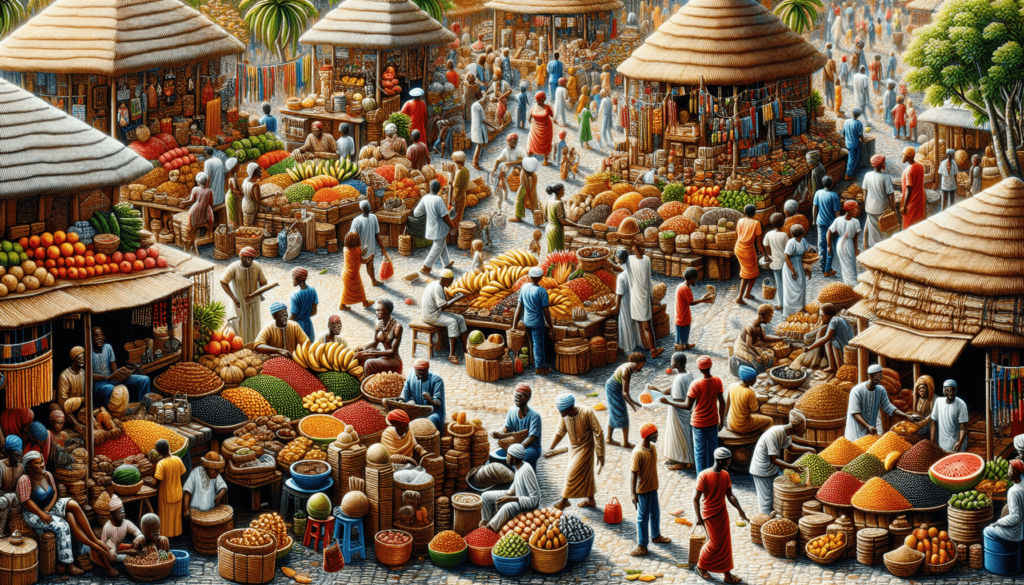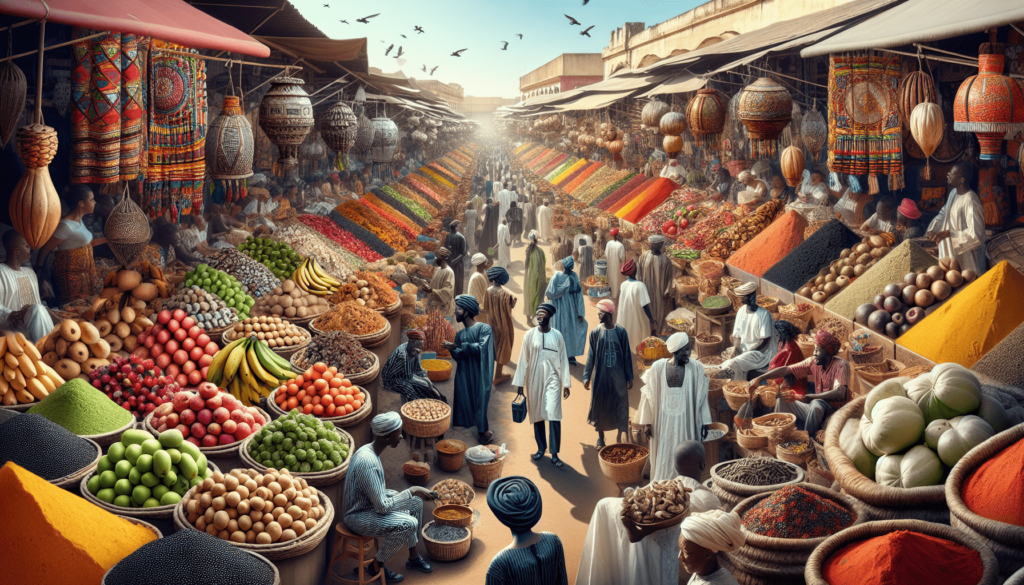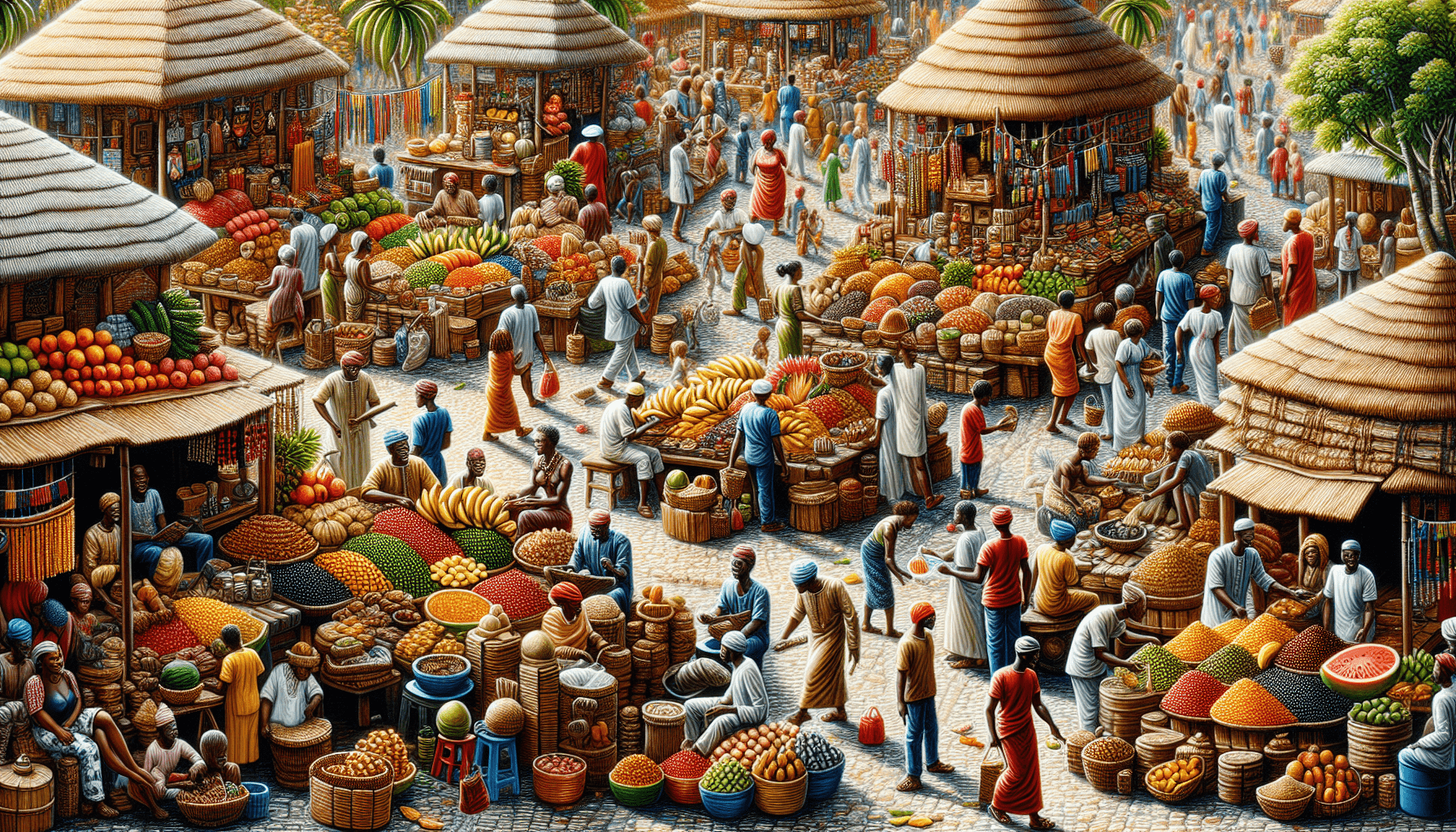Take a journey exploring the traditional markets of West Africa, where you can experience the vibrant and bustling treasure trove of sights, sounds, and flavors. From the colorful stalls overflowing with exotic fruits and vegetables to the lively banter of local traders haggling for the best prices, these markets offer an immersive experience like no other.
Get ready to wander through narrow alleys lined with intricate textile patterns, savor the aromatic spices that hang in the air, and discover unique handicrafts that tell stories of ancient traditions. Join us as we embark on an unforgettable adventure into the heart of West Africa’s rich cultural heritage, where the spirit of community and commerce blend harmoniously in these captivating markets.
Geographical Overview
Location of West Africa
West Africa is a subregion of the African continent, located on the westernmost part. It is bordered by the Atlantic Ocean to the west and south, with countries like Sierra Leone, Liberia, and Ivory Coast on the coast. To the north, West Africa is bounded by the Sahara Desert, while countries such as Mali, Burkina Faso, and Niger occupy the interior. The region spans approximately 5,112,903 square kilometers and is known for its diverse landscapes, rich cultural heritage, and vibrant traditional markets.
Topography of West Africa
The topography of West Africa is characterized by its diverse terrain, offering a mix of coastal plains, grasslands, savannahs, and plateaus. The coastline is dotted with beautiful beaches and mangrove swamps, providing a favorable environment for fishing and trade.
Moving inland, the terrain becomes more varied, with rolling hills and plateaus dominating the landscape. The region is also home to significant rivers such as the Niger and Senegal, which provide fertile soil for agriculture and serve as crucial transportation routes.
Climate of West Africa
The climate of West Africa varies from north to south and is influenced by factors such as latitude, prevailing winds, and ocean currents. In general, the region experiences a tropical climate, with distinct wet and dry seasons. The northern areas, closer to the Sahara Desert, have a more arid climate, characterized by hot summers and limited rainfall. As you move southward, the climate becomes more humid, with heavier rainfall and lush vegetation. This diverse climate has a significant impact on the agricultural practices and market dynamics in the region.
Importance of Traditional Markets
Historical significance
Traditional markets in West Africa have a rich historical significance, dating back centuries. They have served as vital hubs of trade and cultural exchange, facilitating the movement of goods, ideas, and people across the region.
These markets were often the meeting points of different ethnic groups, fostering social cohesion and cultural diversity. They are remnants of the region’s vibrant past and continue to play an essential role in the present-day economy and cultural identity.
Economic role
Traditional markets are the backbone of the West African economy. They provide a platform for small-scale traders, farmers, and artisans to sell their goods and generate income. These markets are not limited to local trade; they also attract regional and international buyers, contributing to the growth of cross-border commerce.
Traditional markets span various sectors, including agriculture, textiles, crafts, and traditional medicine, making them significant contributors to the overall economic development of the region.
Cultural importance
Traditional markets hold immense cultural importance in West Africa. They are places where traditional customs, rituals, and beliefs are preserved and celebrated. These markets showcase the region’s traditional craftsmanship, from vibrant textiles to intricate sculptures, reflecting the diverse cultural heritage of the people.
Moreover, markets provide a space for storytelling, music, and dance, creating a lively and vibrant atmosphere that brings communities together and strengthens cultural bonds.

Types of Traditional Markets
Open-air markets
Open-air markets are the most common type of traditional markets in West Africa. They are characterized by a bustling, informal setup, where vendors set up temporary stalls on the streets or under canopies. These markets offer a wide range of products, including fresh produce, clothing, household items, and traditional crafts.
The open-air atmosphere creates a lively ambiance, with shoppers engaging in lively negotiations and friendly banter.
Weekly markets
Weekly markets, also known as “day markets” or “roving markets,” are held on specific days of the week in different towns and villages across West Africa. These markets are a significant social event and attract people from neighboring communities who gather to sell and purchase goods.
The atmosphere is vibrant, with various stalls selling fruits, vegetables, livestock, and other necessities. Weekly markets provide a unique opportunity for traders and customers to interact and foster community ties.
Specialized markets
Specialized markets focus on specific products or industries, catering to niche markets. For example, there are markets dedicated to textiles, where vendors sell an array of colorful fabrics unique to the region.
Similarly, there are markets specializing in traditional medicines and herbs, where vendors offer natural remedies for various ailments. These specialized markets cater to specific needs and attract customers seeking specific products or services.
Major Traditional Markets in West Africa
Lekki Arts and Crafts Market, Lagos, Nigeria
Located in Lagos, Nigeria, the Lekki Arts and Crafts Market is a vibrant marketplace that showcases the rich artistic heritage of West Africa. Here, you can find an impressive array of handcrafted art, sculptures, and traditional masks, each telling a unique story. The market is a favorite among tourists and locals alike, offering an authentic experience of West African art and culture.
Dantokpa Market, Cotonou, Benin
Dantokpa Market in Cotonou, Benin, is one of the largest open-air markets in West Africa. Spanning over 20 hectares, it is a thriving hub of economic activity, attracting traders from across the region. The market offers a wide range of products, including food, clothing, electronics, and traditional crafts. Navigating through its bustling alleyways is an adventure in itself, immersing you in the vibrant energy of West African market culture.
Sandaga Market, Dakar, Senegal
Sandaga Market in Dakar, Senegal, is a bustling market known for its vibrant textiles and fabrics. The market is a treasure trove of colorful materials, from intricately designed wax prints to bold, geometric patterns. It is a haven for fashion enthusiasts, as well as those seeking unique pieces to decorate their homes.
Sandaga Market provides an opportunity to explore Senegal’s rich textile traditions and indulge in the vibrant colors and patterns of West African fashion.

Unique Features and Products
Colorful textiles and fabrics
One of the most distinctive features of West African traditional markets is the abundance of colorful textiles and fabrics. These fabrics, often made using traditional dyeing techniques, boast intricate geometric patterns and vibrant hues.
Fabrics such as Kente, Ankara, and Adire are sought-after for their unique beauty and cultural significance. Whether you’re looking for a stunning outfit or a piece to add a splash of color to your home, West African markets offer a myriad of options.
Handcrafted art and sculptures
West Africa has a rich tradition of craftsmanship, and traditional markets are the perfect showcase for these talents. From wooden carvings to metalwork and pottery, you can find an array of handcrafted art and sculptures.
Each piece carries its own symbolism and cultural importance, representing the stories and beliefs of the communities that produce them. Traditional markets provide a platform for local artisans to sell their creations and keep these ancient crafts alive.
Traditional medicines and herbs
Traditional markets in West Africa also play a crucial role in the preservation and sale of traditional medicines and herbs. Vendors offer an assortment of natural remedies and herbal concoctions believed to possess medicinal properties.
These traditional medicines are deeply rooted in the region’s cultural and spiritual practices, and exploring the markets allows you to learn about the traditional healing methods and connect with the wisdom of the past.
Social Dynamics
Negotiation and haggling
One of the defining characteristics of traditional markets in West Africa is the art of negotiation and haggling. Bargaining is an integral part of the market experience and is expected in most transactions. Both vendors and customers engage in friendly haggling, trying to reach a mutually acceptable price.
This process adds a sense of camaraderie and excitement, as people test their bargaining skills and find satisfaction in securing a good deal.
Community engagement
Traditional markets are not just places of commerce; they are community gathering spaces. They serve as social hubs where people from different backgrounds come together, fostering social cohesion and a sense of belonging.
Markets offer opportunities for conversations, storytelling, and sharing experiences, strengthening the fabric of the community. It is in these bustling markets where friendships are forged, and relationships are nurtured.
Role of women in the markets
Women play a vital role in West African traditional markets, both as vendors and as customers. Many women are active participants in the market economy, selling produce, textiles, and crafts. They contribute significantly to the household income and economic well-being of their families.
Women also play a crucial social role in the markets, often acting as mediators and peacemakers. Their presence and influence contribute to the vibrancy and inclusivity of these marketplaces.
Market Organization and Structure
Vendor stalls and sections
Traditional markets are organized into vendor stalls and sections, dividing the market into different areas of specialization. Each stall is typically run by an individual or a family, specializing in a specific product or trade. You can find sections dedicated to food, clothing, crafts, and household items, creating a diverse and vibrant shopping experience. This organization allows customers to navigate the market more efficiently and find the products they seek.
Market regulations and governance
Traditional markets often operate under unofficial governance structures, with informal rules and regulations. Local authorities and market associations play a role in managing these markets, ensuring fair practices and resolving disputes.
While regulations may differ from one market to another, they typically focus on maintaining hygiene standards, preventing fraud, and maintaining a harmonious trading environment. These rules help maintain order and fairness within the market.
Market day activities and rituals
Market days are significant events in West African communities, with activities and rituals that add to the vibrant atmosphere. In some areas, market days are associated with specific traditions and ceremonies. For example, in certain communities, the market day may start with prayers and offerings to ensure a successful trading day.
Market day also attracts street food vendors, musicians, and entertainers, creating a festive ambiance that adds to the overall market experience.
Challenges and Opportunities
Competition from modern supermarkets
Traditional markets in West Africa face competition from modern supermarkets and shopping malls that offer convenience and a wide variety of products. While these modern retail spaces provide their own advantages, traditional markets offer a unique cultural experience and a direct connection with local communities. The challenge lies in striking a balance between preserving traditional markets’ authenticity and adapting to changing consumer preferences.
Infrastructure and sanitation
One of the significant challenges faced by traditional markets is the lack of adequate infrastructure and sanitation facilities. Many markets are located in overcrowded and poorly maintained areas, leading to issues such as inadequate waste management and hygiene.
Addressing these challenges requires investment in improved infrastructure, waste management systems, and hygiene practices, ensuring the well-being of both vendors and customers.
Preservation of traditional practices
As West Africa progresses and embraces modernization, there is a need to ensure the preservation of traditional practices in markets. It is essential to support artisans and craftsmen, providing them with the resources and opportunities to continue their traditional trades.
This may involve initiatives such as skill development programs, financial support, and market access. By preserving traditional practices, West African markets can maintain their uniqueness and cultural heritage.
Tourism and Cultural Exchange
Attraction for tourists
Traditional markets are popular tourist destinations in West Africa, attracting visitors from all over the world. Travelers are drawn to the vibrant colors, unique products, and cultural experiences these markets offer.
ourists have an opportunity to immerse themselves in the local culture, learn about traditional craftsmanship, and support local artisans. The authenticity and vibrancy of traditional markets make them an unforgettable experience for tourists seeking to understand the cultural tapestry of West Africa.
Promotion of local culture
Traditional markets play a crucial role in promoting and preserving local culture in West Africa. These markets are spaces where traditional customs, craftsmanship, and culinary traditions are celebrated and shared. By supporting local artisans and vendors, tourists contribute to the preservation and continuation of these cultural practices.
Connecting with the local community through traditional markets allows travelers to gain a deeper appreciation of the region’s rich cultural heritage.
Sustainable tourism practices
The growing interest in traditional markets also presents an opportunity for sustainable tourism practices. Local authorities, communities, and travelers alike can adopt responsible tourism practices that minimize the impact on the environment and respect the local culture.
This may include promoting fair trade, supporting eco-friendly initiatives, and engaging in cultural exchange activities that empower local communities. By practicing sustainable tourism, visitors can ensure the long-term viability and preservation of traditional markets.
Exploring The Traditional Markets Of West Africa
Preserving the heritage of West African markets is essential to maintaining the cultural richness and economic vitality of the region. Traditional markets offer not only an avenue for economic growth but also a space where communities come together, cultural traditions are celebrated, and stories are shared.
By appreciating the value of traditional markets, encouraging responsible tourism, and supporting local artisans, we can ensure these timeless marketplaces continue to thrive for generations to come. So, next time you visit West Africa, remember to explore its traditional markets, immerse yourself in the vibrant ambiance, and treasure the experiences and connections you make along the way.

